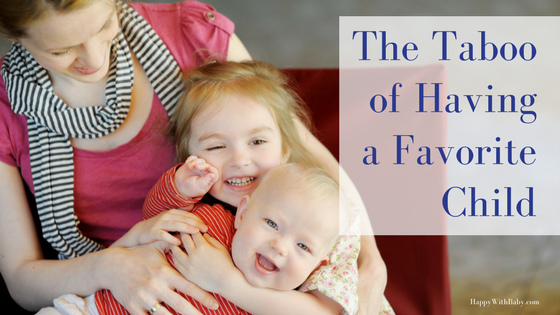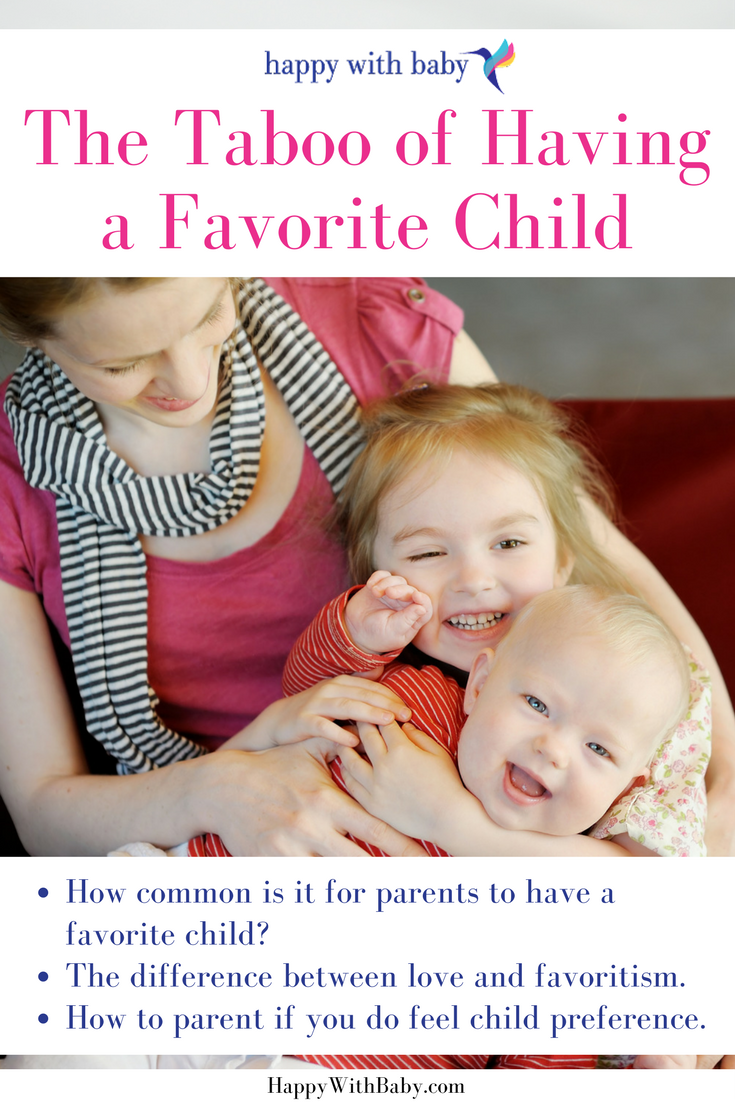The Taboo of Having a Favorite Child
DO WE REALLY LOVE EACH OF OUR KIDS THE SAME?

When I was pregnant with my daughter (our second child), I distinctly remember being really worried that I would not be as in love with her as I was with my son (our first).
In fact, my husband and I use to joke that we shouldn't have a second kid because he was so awesome and perfect--there was just no way our second could live up to that. “Our next kid would probably be a total nightmare,” we’d tease.
OK, time-out! I realize how that sounds. Even looking at the words I just typed out, I feel bad about it. Like, can I actually say that publicly? Of course, we didn’t mean it. We were just playing around with each other. But admitting it feels like the ultimate parenting sin. And that’s exactly what I want to confront in this post.
We are often told by our own parents that we are all loved the same and we are taught that this is what good parents do--they love each of their kids the same. But it isn’t very realistic. Every child is different, with different personalities and interests, and needs. And we as parents have different personalities, interests, and needs too. And, that’s a lot to navigate.
For the record, we did end up having that second child and it turns out she's just as awesome, but in very different ways.
Honest mom confession:
At any given moment, one of them is probably more my favorite, depending on who isn't whining, yelling, wanting something I just told them they couldn't have, making a mess, complaining about dinner, who doesn't wake me in the night, etc etc.
They also have different personality characteristics that, because of the personality that I have, I’m sometimes more tolerant of. For example, sometimes I like it when they are just like me, and other times I find it to be very annoying.
I also notice my tolerance for either one can be dramatically affected by how well I’m prioritizing my sleep and self-care habits. (I swear, so much all comes back to sleep and self-care!)
But this is all just my personal experience with favoritism. And I know I’m not the only one. So, let’s talk about how common child favoritism actually is.
A recent study has shown that “75% of mothers admitted to being closer to one adult child.” Another study observed that “70% of fathers and 74% of mothers demonstrated preferential treatment to one of their children.”
I think we can safely say that most parents have a favorite child.
Maybe not all parents will admit it. And maybe some parents are really good at not showing it in the way that they parent. But, deep down, probably most parents have a favorite.
But if we are taught that we must love all of our kids the same, and if we don’t want to risk inadvertently hurting one child by making him or her feel like they are loved less, then how are we supposed to move forward and parent all of our kids with honesty and sensitivity?
First off, I think if you’re actually reading and considering this post right now, then that shows that you’re self-inquisitive enough that you’re not going to just go through the motions as a parent without a certain level of consciousness. You may have already felt some degree of worry that you might make a mistake with your kids by showing favoritism. I’m not necessarily advocating for excess worry here (we all have enough on our plates, right?!), but the parents that I’d be more concerned about showing preferential treatment to a damaging degree are more likely the ones that don’t even realize they’re doing it or don’t see it as a problem.
Second, I think it’s important to make the distinction that love and favoritism are not the same things.

On Psychology Today, Ellen Weber Libby Ph.D says that, “Love connotes tender feelings and strong affection usually accompanied by loyalty and devotion. In contrast, favoritism implies choosing or preferring one person over another. Parents may love all their children...and at certain times, prefer or favor one over others.”
So, favoritism doesn’t necessarily mean that you love one child more or less than another.
Favoritism instead might just mean that you have common interests, or similar personality types, or are the same gender or the opposite gender--and because of those things, it might just be easier to find ways to connect.
Or, favoritism might depend on the age or developmental stage your child is in. Just like parents can have preference for one child over another, parents also often have preference for certain ages over others. For some parents, the baby phase might be a favorite time and the “terrible twos” are really challenging. Or, vice versa: Some parents have a really hard time with the baby phase, but love it when their child is preschool age and is full of conversation and imagination. This can flip-flop well into adulthood, as kids go through their rebellious phases or become easier to be around.
To be completely honest, I’m not even a fan of using the word “favoritism” because it suggests a good-better-best sort of ranking. What I think we are really talking about is the difference and how easy or hard it is to connect with your kids. That easy connection you feel with one child is a gift. It’s incredible and really fun. There’s no reason to feel bad about that. But I also think that this poses us with a challenge to grow both as parents and as people, as we try to connect more with the “less favored” kid.
Because the truth that many of us grown adults know too well is that when one of us grew up as the favorite in our families, both kids suffer. The unfavored kid feels resentment and the favored kid feels guilt. And these feelings last well into adulthood.
So, here’s how I think we can do a better job at honoring the differences in our relationships with our kids:
-
Regardless of how you feel deep down about each child, hold each child accountable to the same standards. What I mean by this is, the basic rules based on your family’s values apply to each child. If good grades are a value, don’t praise the good student while shaming the one that doesn’t perform as well. By the same token, don’t offer the lower-performing student all the support they could need while the good student goes unnoticed. Offer individualized praise and support to both in ways that positively impact both kids. Or, when teaching small children to pick up their toys, one might be more focused and easily does what she's told and the other more "spirited" child might be more all over the place. You can try to make it into a game so that they're both engaged, and then praise both of them for their effort. As Ellen Weber Libby, Ph.D. says, “When parents hold favorite children accountable to the same standards as other children, then the presence of cruelty is unlikely.”
-
If you feel a natural inclination toward one child, practice finding ways to connect with your other child. This might require a little extra effort on your part. For example, it might feel really natural and easy for you to play with one child--either because you have a similar interest or gender--but perhaps reading stories with your other child could be your special way of connecting with them. Or, running errands might be really enjoyable with one child because of their easygoing nature, but perhaps a high-energy mommy and me dance class is a good fit for you and your more rambunctious child.
-
Honesty and care will go a long way. If your child expresses that they’re feeling left out or unloved, you never want to deny what they perceive to be true. Ellen Weber Libby, Ph.D. says that “Children know what is true in a family, who is favored and who is not. To deny this truth undermines children's confidence in trusting their perceptions of reality. Bringing up children to question themselves, to not trust their views of reality is a form of cruelty.” So, have a conversation with them that validates their perception, but also highlights what makes their relationship with you unique. Say your child says to you that their older brother is your favorite and that makes them angry. Honesty is important here, but you need to take it a step further: You can respond by saying, “You know what, I can see why you would feel that way because I do do a lot of things with your brother that you and I don’t do. I think it’s because he and I both like to do the same things, and those are things that you don’t like to do. That must feel really unfair. But you know what I love about you? You teach me so many new things that I didn’t know before and I think that makes me a better person. You challenge me to be better and I love you for that.”
-
Get on the same page with your partner. To clarify, this doesn’t mean that you have to approach things in the exact same way. Each parent is going to have their unique parenting style and that’s OK. The important thing is to be in communication with each other about what you both feel and believe and how you’ll handle things. It’s important that you don’t contradict each other, especially in front of the kids. For example, I know of a set of parents that had two starkly different approaches to parenting siblings: One parent believed in doing everything the same for the kids--if one kid got a Gameboy for Christmas, then the other needed to get a Gameboy too because it was the most fair approach. The other parent preferred to take each kid’s individual personality into consideration and bought different gifts for each kid, but spent the same amount of money on each kid. To this parent, this acknowledged each child’s individuality. This disconnection between the two parenting philosophies caused the two kids to grow up believing that one was the favorite because of the different treatment when that wasn’t necessarily the case. I’m not suggesting that one parenting style is more correct here. But this does highlight how essential being in communication with your parenting partner can be, so that you’re not sending mixed messages to your kids.
It really is amazing how different one child can be from the next, even when they come from the exact same gene pool. Don’t you think?
I’m always in awe of how much my kids are their own people and how obvious this can become even from day one. I really think we are handed such a gift when we agree to take on this new role to become parents. Every single day, we have the opportunity to get to know our kids as the unique individuals they are. No one else gets to watch this unfold as closely as we do as parents. And if we can continue to parent from this place, then we’ll all do just fine.
Now, it’s your turn! How are your kids different from each other? Is one kid easier or harder than the other? How do you find ways to have a special connection with each of them?
Subscribe
Sign up to get the latest weekly blogs sent straight to your inbox


0 comments
Leave a comment
Please log in or register to post a comment